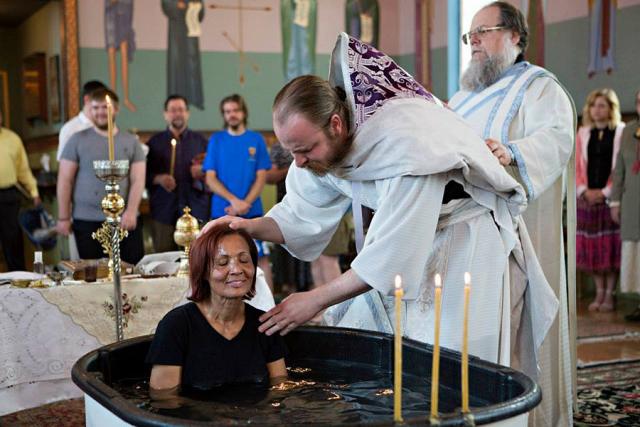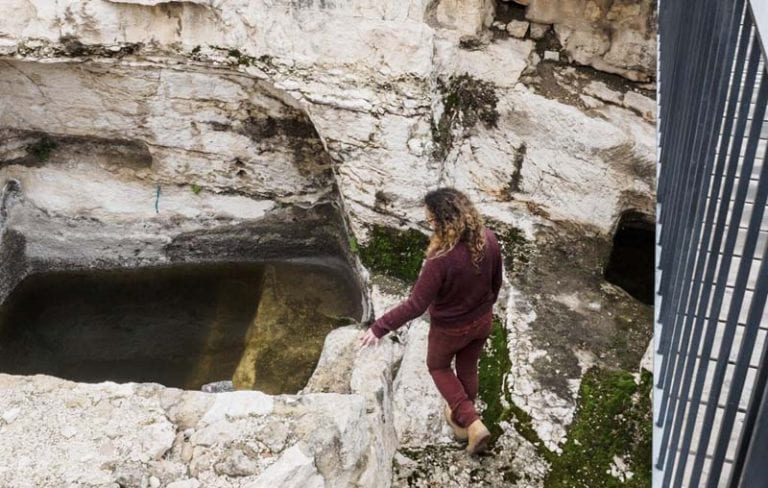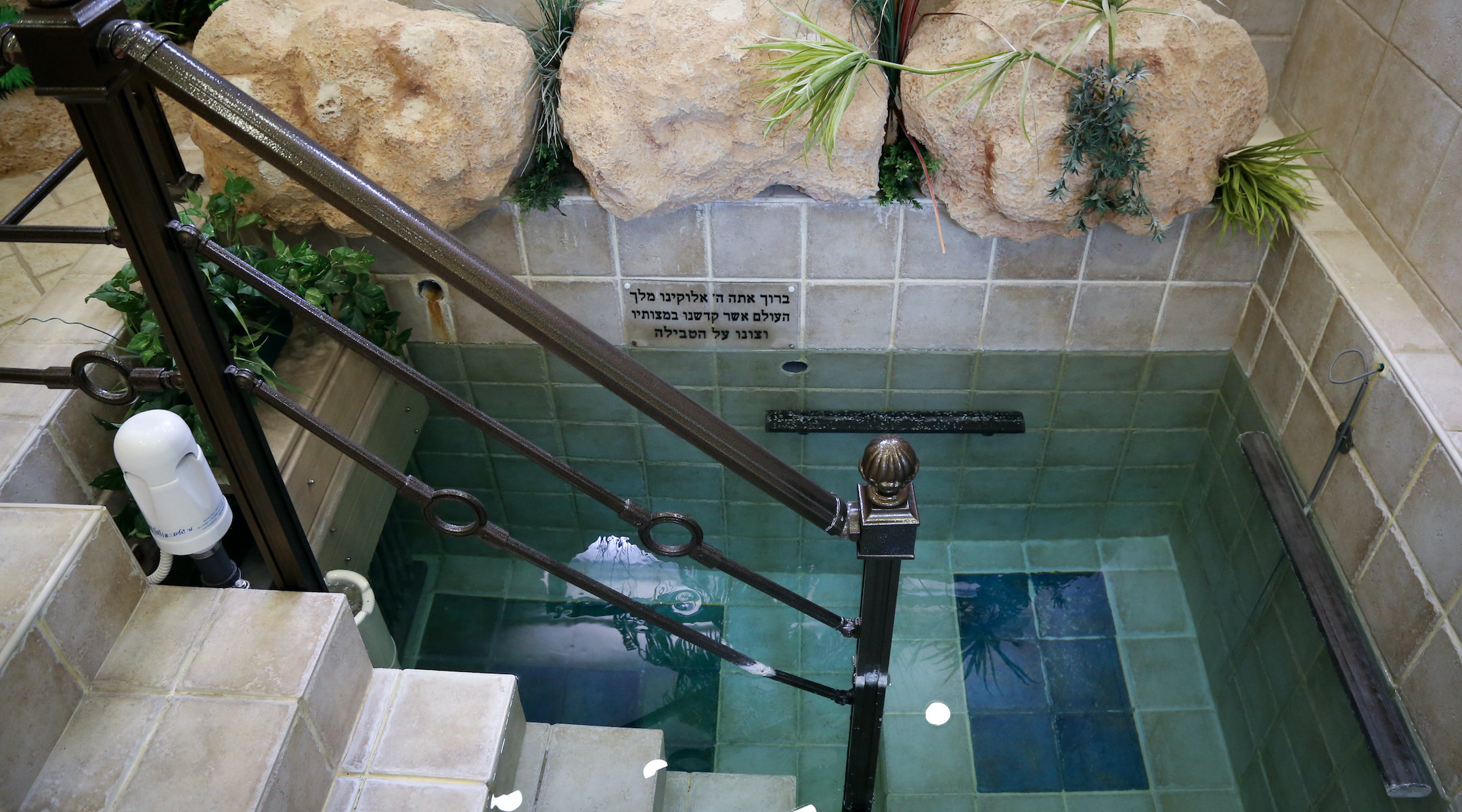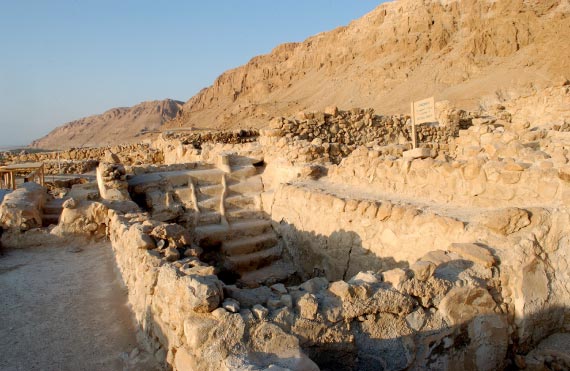Baptism through Water and Fire
It is a common belief that the immersion in water or baptism is merely an outward expression of faith. “One baptism for the remission of sins” found in the Nicene-Constantinopolitan Creed, is declared by all Christian mainstream churches, and the baptism in water is often considered the fundamental Christian belief.
And if we read Strong Dictionary for the Greek βαπτίζω baptizo, Strong entry G907, we are surprised to find out that baptism [in water] was “used only in the New Testament of ceremonial ablution, especially of the ordinance of Christian baptism”. But there is nothing in the Scripture that can justify this belief.
Besides, if we read closely the Apostolic Writings, we will find out that Yeshua haMashiach (the Messiah) baptized no one in water; His cousin Yochanan did, but not Yeshua.
So, can we rethink this?
The Hebrew immersion vs. the Greek baptism
The Hebrew word for a ritual purification in water is מִקְוֶה mikveh. It comes from the verb קָוָה kavah, to bind together, to collect; figuratively, to expect (see Psa 39:7, Psa 52:9, Psa 69:6). The noun mikveh means something that is collected for a purpose, waited for, confidence, hope; also a collection (of water), pool.
The very literal meaning of kavah and its connection with mayim, waters, we find in the Creation, when Elohim said,
Gather together the waters under the heavens into one place, and the dry land appear. And it existed so. (Gen 1:9)
The letter מ mem, in mayim and mikveh, has its name from the ancient pictograph of water, hence מַיִם mayim, the word for water. Throughout Scripture, the living [moving] water represents a constant change, especially change in the mind and in the heart.
With this meaning mayim, water, is closely related not only to its literal meaning of purification in water, mikveh, but also to a constant renewal of man’s mind and heart.
With its figurative meaning of confidence, hope, expectation, mikveh is used in Jeremiah, as we read thus,
O hope of Israel, its savior in time of distress, why should you be like a stranger in the land, or like a traveler who turns aside to lodge? (Jer 14:8)
It is interesting to note here that there is another word for “hope”, which too derives from the verb קָוָה kavah: תִּקְוָה tikvah, hope; HaTikvah, the Hope is also the national anthem of Israel. Literally, tikvah means a cord (as a strong attachment to something), but figuratively: expectation, thing that is longed for. Read more about “hope” from the Hebraic perspectives here.
With that being said, we will explain in this study that contrary to the mainstream theology, the immersion in water for purification, mikveh, is not “outward expression of faith” pertaining to “the New Testament”, but it is an inward expression of faith whose purpose is to bring a sinner to repentance and connect him or her to the Creator in hope and expectations.
In the Scripture there are two types of immersions or baptism: in water and in fire, as we will explain below.
Baptism in water
YHVH commanded Mosheh to assemble the congregation at the door of the Tent of Appointment. So Mosheh brought Aharon and his sons and washed them with water, and dressed him in the robe and the shoulder garment.
And he put the breastplate on him, and put the Urim and the Tummim in the breastplate, and the turban on his head. And on Aharon’s forehead, he put the golden plate, the set-apart sign of dedication, as YHVH had commanded Mosheh (Lev 8:4-9). After this the act of consecration commenced.
The consecration of the priests, by washing, clothing, and anointing, is not merely washing their hands and feet, but cleansing from all bodily uncleanness. This act of the washing of the body, no doubt, was a symbol of the putting away of the uncleanness of sin, and therefore, should be seen also as an act of the cleansing of the mind and heart, without which no one could even draw near to YHVH Elohim.
David understood this act of complete cleansing as a necessary prerequisite before the confession of his sins he committed with Uryah’s wife Bath-sheva, which Nathan the prophet exposed before the king. David beautifully expressed the pain in his heart in his confession before YHVH thus,
Have mercy on me, O Elohim, according to Your lovingkindness. According to the greatness of Your compassion, blot out my transgressions. Wash me completely from my guilt, and cleanse me from my sin. For I know my transgressions, and my sin is ever before me. Against You, You alone, have I sinned and done evil in Your eyes that You might be proven right in Your words. Be clear when You judge. Look, I was formed in iniquity, and in sin my mother conceived me. Look, You have desired truth in the inward parts, and in the hidden part You make me know wisdom. Cleanse me with hyssop, and I am clean. Wash me, and I am whiter than snow. (Psa 51:1-7)
For more knowledge of David’s confession prayer, read the article “Prayer on Yom Kippur—a Psalm of David” from the series The Appointed Times of YHVH.
The story of David and Bath-sheva is reminiscent of a peculiar law in the Torah concerning a woman suspected in adultery, whose guilt was not yet established, and her husband does not know yet if his suspicions are justified. This is the law of jealousy.
The law of jealousy provides that if the woman is innocent, Elohim will help her to prove her innocence.
In such a case, the priest shall make the woman swear, that if no man has lain with her, she shall be free from the bitter water that brings a curse. But if she has defiled herself, then the priest shall make the woman swear with the oath of the curse, and he shall say to the woman,
Yehovah make you a curse and an oath among your people, when Yehovah makes your thigh waste away and your belly swell, and this water that causes the curse shall go into your inward parts, and make your belly swell and your thigh waste away. And the woman shall say, “Amein, amein”. (Num 5:22)
And the priest shall write these curses in a book and shall wipe them off into the bitter water, and shall make the woman drink the water that brings the curse and it shall enter her to become bitter (Num 5:24).
And if she has defiled herself, her belly shall swell, and her thigh shall waste away, and thus the woman shall made an example of the people. But if she has not defiled herself, then she shall be clear of guilt and blessed with the capacity to conceive and bring forth children (Num 5:28).
After the woman’s Amein, the curses contained in the oath, are washed away in the bitter water, so that they should be imparted to it. This we can see as a symbolical act to set forth the truth by the Creator who imparted to the water the power to act on a guilty person but not to harm an innocent one.
The idea of the curse is this: since the transgression began through the belly and thighs, therefore the punishment begins with them. In other words, the punishment comes from the same source as the sin and fall on those bodily organs with which the woman has sinned: the organs of lust.
We should note here that the name YHVH, written on a piece of parchment and blotted out with the water, appears twice in these curse and oath. We should note also that this is the only case recorded in the Torah in which YHVH Elohim allows His Set-apart Name to be blotted out. Why?
YHVH allows His written name to be blotted out in the bitter water in the hope of reconciliation of a husband and wife. The feeling of jealousy should not be allowed to reside in the family forever, and the guilt to be left unpunished. The “bitter waters” actually examined the husband as well: whether he has accused his wife falsely.
Thus, the main goal of the law of jealousy is not the punishment itself but the removal of sin through water, and it is not that water removes the sin but the power of Ruach haKodesh of YHVH.
The law of jealousy of a woman suspected by her husband of being unfaithful reminds us to the story of Miryam and Yosef who suspected his wife in adultery but did not resort to this law because of a good disposition of the heart and for the sake of her. The rest we know; through Miryam became the mother of the Messenger of YHVH in flesh, Yeshua haMashiach.
Note: Nothing is said about what was to be done in case a woman refuses to take the oath. In such a case, that would be a confession of her guilt, and she had to be put to death as an adulteress together with the adulterer, according to Lev 20:10. Thus, the man is placed on an equality with the woman, and the apparent partiality, that a woman can be punished for adultery, but not the man, is removed.
Yochanan’s baptism in water
The practice of washing in water for the removal of sins continued until the destruction of the Temple and Jerusalem by the Romans. A strong parallel between Yochanan (the immerser) and the Qumran community in the 1st century Judea is that of the importance given to the practice of baptism in water.
The followers of the Qumran community, known for its strict observance of the Torah and seclusion from the society, believed that water baptism was symbolic of a greater cleansing of sins performed by Ruach HaKodesh, the Breath of the Set-apart One. For more insight on the matter refer to the article “The Hebrew Ruach HaKodesh vs the Roman Holy Spirit“.
There are strong arguments among the scholars that Yochanan was a member of this sect before he left it to found his own ministry with many disciples.
The baptism in water was certainly regarded as of high priority to Yochanan and the Qumran sect, as we see him baptizing in the Yarden River (Mat 3:6, Mar 1:4-5, Luk 3:2-3).
Further we read in the ancient Hebrew manuscript of the Gospel of Matthew thus,
And Yochanan answered all of them. Behold, in truth I am here, baptizing you in the days of repentance, but another comes mightier than I whose sandal I am not worthy to unfasten. He will baptize you with the fire of the breath (Ruach) of the Set-apart One (haKodesh). (Hebrew Mat 3:11, by George Howard, Mercer University Press, 1995),
First, we should note the difference between the Greek and the Hebrew readings. The Greek has, “he will baptize you with the holy spirit and with fire”, implying two agents of baptism — “the holy spirit” and “fire” — while the Hebrew has, “he will baptize you with the fire of Ruach haKodesh, wherein the converting agent is Ruach haKodesh, the power of YHVH Elohim, through the instrument of fire: the core belief of Yochanan and the Qumran sect.
The Christian theologians believe that the verse above refers to the baptism of “the Holy Spirit” and the establishment of “the Church” on the day of Pentecost, when the “tongues like as of fire” fulfilled this prophecy.
But, Yochanan clarified what he indeed meant in the following verse 12. We will read again from the Hebrew manuscript of Matthew,
His winnowing fork is in his hand to fan his threshing-floor he will gather the grain into his granary and the straw (he will burn with fire which is not quenched). (Hebrew Mat 3:12)
As seen in the context, this clarification undoubtedly refers not to the birth of a new religious body, i.e. “Church”, but the days of Reckoning at His second coming, when the Set-apart One will do away with sin through the judgment of the baptism of fire.
The Messiah will immerse in fire
We read further in the proper context the very words of Yeshua haMashiach,
I came to send fire on the earth, and how I wish it were already kindled! But I have an immersion to be immersed with, and how distressed I am until it is accomplished! Do you think that I came to give peace on earth? I say to you, no, but rather division. (Luk 12:49-51)
There are two statements in Mat 3:12 and Luk 12:49: “the straw he will burn with unquenchable fire” and “I came to send fire on the earth”, both referring to a different type of baptism: the immersion in fire.
The second part of the statement “and how I wish it were already kindled” (but it is not) is very emblematic and most definitely is referring to a future event, that of His return, since it has yet to be fulfilled.
But, notice the past tense Yeshua used in the prophecy: “I came to send fire”. Why did Yeshua use a past tense, as if He had already fulfilled it?
It is quite common for the Scripture to employ the past tense in the prophecy instead of the future tense for events that will take place in the future.
Thus, when reporting prophecies, the Scripture very frequently describes future events in the past tense, as if they had already taken place; this is the so-called “past tense in the future” in Hebrew. When used in such a manner, the past tense in the future denotes certainty of the prophecy in its fulfilment.
Very often the past tense in the future is misunderstood by the Gentile theologians, which resulted in misinterpretation of certain prophecies. But in this case it is very clear what Yeshua was referring to: to an immersion in fire that will be certainly fulfilled at His return.
But until then He said, “But I have an immersion to be immersed with, and how distressed I am until it is accomplished!” thus speaking of His death through crucifixion.
With that being said, we are coming to the second type of baptism in our study: the immersion in fire.
And indeed Yochanan immersed in water, but haMashiach will send fire on the earth (euphemism for baptism in fire).
Baptism in fire
I was looking until thrones were set up, and the Ancient of Days was seated. His garment was white as snow, and the hair of His head was like clean wool, His throne was flames of fire, its wheels burning fire. A stream of fire was flowing and coming forth from His presence, and a thousand thousands served Him, and ten thousand times ten thousand stood before Him, the Judge was seated, and the books were opened. (Dan 7:9-10)
Flames of fire are proceeding from the throne of the Ancient of Days, as if they are consisted of it, and the wheels of His throne are scattering forth the fire. Fire is the constant phenomenon of the manifestation of the Creator in the finite world.
Fire as the most powerful of the earthly elements is most fitting for the representation of the burning zeal with which Elohim punishes and destroys sinners. But one must not take fire exclusively as an instrument of punishment, because fire also purifies and cleanses, like gold and silver are purified in fire.
To better understand the baptism in fire, let us learn from the parable of the silversmith. Mal 3:3 portrays Elohim as a silversmith,
And He shall sit as a refiner and a purifier of silver. And He shall purify the sons of Levi and refine them as gold and silver. And they shall be to Yehovah, bringing near an offering in righteousness.
Let us reason in a plain Scriptural language what the prophet is conveying in the context.
Look, I am sending My messenger, and he shall prepare the way before Me. Then suddenly the master you are seeking comes to His Temple, even the Messenger of the covenant, in whom you delight. Look, He is coming, said Yehovah of hosts. (Mal 3:1)
In Mal 3:1-2, we read that with the coming of the Messenger of the Covenant the judgment through fire will begin. The Messenger of His Face will be like a purifying fire that will burn out all the dross adhering to the precious metal (Zec 13:9). As a purifying fire purifies gold and silver from impurities, so will the Messenger of YHVH refine the sons of Levi, as we read in Mal 3:3.
The fact that the sons of Levi are named is to be explained from what is written in Eze 9:4-6 and 1Pe 4:17, namely, that the cleansing will begin with His House: the Levitical priesthood. When the priesthood and the covenant people are first purified and cleansed, then the judgment upon the nations will come with certainty. The prophecy continues,
For look, the day shall come, burning like a furnace, and all the proud, and every wrongdoer shall be stubble. And the day that shall come shall burn them up, said Yehovah of hosts, which leaves to them neither root nor branch. (Mal 4:1, in Hebrew 3:19)
This purification in fire, however, does not consist merely in the fact, that the wrongdoers will be cut off. But that the immersion in fire will be also for testing; a precious metal is being tested in fire for impurities, so that those who are uncorrectable will be cut off, and the correctable will be refined even through fire, as the prophecy continues further,
But to you who fear My Name the sun of righteousness shall arise with healing in its wings. And you shall go out and leap for joy like calves from the stall. (Mal 4:2)
How the purification in fire works
A silversmith holds the piece of silver in the fire and lets it heat up. Once the level of heat is reached, the impurities start coming up on the surface to be removed. But the silversmith has to keep his eyes on the purification the entire time. If the precious metal is left longer in the heat, it would be destroyed.
How does the silversmith know when the silver is fully refined? When it is completely set apart from the dross and it so shiny that he sees his image in it. Then the silver is considered pure and refined. Then and only then it can serve its purpose, as the silversmith has desired.
Likewise, it is with men. The Silversmith will turn the heat up (as a matter of fact, it has been already turned up) on men and the “dross” will soon start coming up. When all impurities will come up on the surface, they will be removed, so that the Silversmith should see His image in those who will be found correctable, but those who are uncorrectable will be cut off.
Beloved ones, do not be surprised at the fiery trial that is coming upon you, to try you, as though some unusual matter has befallen you, but as you share Messiah’s sufferings, rejoice, in order that you might rejoice exultingly at the revelation of His glory. (1Pe 4:12-13)
(See also Psa 66:10, Psa 139:23-24, Pro 25:4, Mat 24:13, Jas 1:12, 1Pe 1:7, 1Co 3:13, 1Co 10:13, Heb 12:7).
It is well known that YHVH Elohim only tests the righteous, but the wicked he hates and destroys, as David said in Psa 11:5,
Yehovah tries the righteous, but His soul hates the wrong and the one who loves violence. (Psa 11:5)
The tests on the righteous are not to demonstrate anything to Him He does not know. If the Creator knows His entire universe, how much more He knows the heart of man. If He indeed subjects man to tests it can be in order to demonstrate his sins to him in order to discipline and build him up, not to destroy him.
However, in a test Elohim may seek to find if men will criticize Him for the way of doing His test.
But, once the righteous is tested and his faith is confirmed, then the further purpose of the test is to demonstrate the service of the one being tested to those around him.
This immersion in fire that is coming upon mankind as a “fiery trial” is foretold in the ancient prophecies,
And I shall bring distress on men, and they shall walk like blind men, because they have sinned against Yehovah, and their blood shall be poured out like dust and their flesh like dung. Neither their silver nor their gold shall be able to deliver them in the day of the wrath of Yehovah. And by the fire of His jealousy all the earth shall be consumed, for He makes a sudden end of all those who dwell in the earth. (Zep 1:17-18)
And,
And it shall be throughout all the soil, declares Yehovah, that two thirds therein are cut off and die, and one third is left therein. And I shall bring the third into fire, and refine them as silver is refined, and try them as gold is tried. They shall call on My Name, and I shall answer them. I shall say, ‘This is My people’, while they say, ‘Yehovah is my Elohim’. (Zec 13:8-9)
But why fire and not water again?
The Flood then the furnace
We should recall the universal Flood in which all mankind was destroyed except for eight human beings. The water that destroyed the corrupted mankind, even though being the most powerful and destructive force of the four elements, did not destroy the nature but spared it. Read more here.
Since then every time we see the rainbow in the heavens we know that the Creator has sworn to mankind never to destroy it by water, as He did in the time of Noach.
Today, however, it is different: mankind and nature are corrupted altogether. The mankind has gone so far not only to corrupt itself through homosexuality, pedophilia, transgederism, and other perverted sexual practices, but to do so to the nature by creating genetically modified animals and plants. Thus the nature too became corrupted. The earth is polluted with harmful chemicals, nuclear waste, and bloodshed in abortions, murders, euthanasia, senseless wars, and terrorism.
This is the wickedest generation that has ever existed on the face of the earth. The people of the Flood, who were destroyed by water, and the people of Sodom and Gomorrah, who were destroyed by fire, would have more excuses on the Judgement Day than this generation would do.
This kind of corruption of mankind and nature in the last days can be cleansed only by fire.
What the water is not able to do, the fire will; water can destroy only the air-breathing creatures, but fire is indeed powerful to virtually destroy everything. Unlike water that leaves only destruction behind it, fire has also the power to cleanse and purify, and give a new beginning.
For the coming of the millennial kingdom of the Messiah the earth will be reset once again, this time through fire. For this type of cleansing water is merely insufficient to do the job. That is why in His promise to Noach not to destroy men with water YHVH Elohim said nothing about fire.
Therefore, as we learned (see also Mat 3:6, Mat 3:11, Mar 1:4-5, Luk 3:2-3), the baptism in water is for repentance and forgiveness of sins, while the baptism in fire is for punishment and cleansing: two different immersions for two different purposes.
So, why did haMashiach not baptize anyone but was baptized? Because His mission is to baptize in fire: to cleanse and purify, and bring a new beginning.
Navah
May we merit seeing the coming of our Mashiach speedily in our days.





